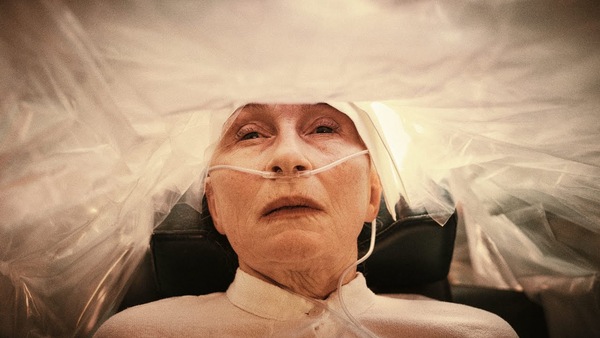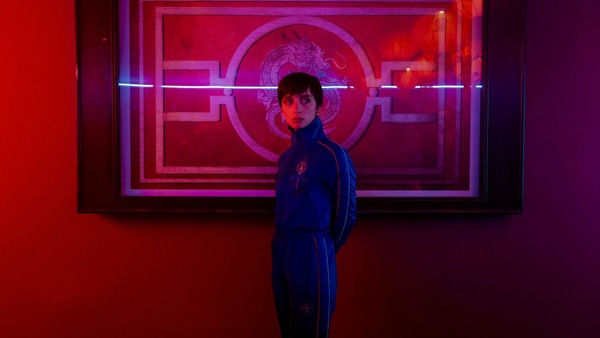Newsletter | Dane(ger) Zone: 2 Greats Return To TV. Only 1 Wows
Prahlad Srihari contrasts Danish creators Lars Von Trier and Nicolas Winding Refn's returns to episodic TV, with The Kingdom: Exodus and Copenhagen Cowboy, respectively.

Last Updated: 01.30 PM, Feb 07, 2023
This column was originally published as part of our newsletter The Daily Show on February 2, 2023. Subscribe here. (We're awesome about not spamming your inbox!)
***
BRING UP THE NAMES of either Lars Von Trier or Nicolas Winding Refn in a room full of cinephiles, and there will be jeers from one side and cheers from the other. The two cinematic agitators, both Danish, both pushing the envelope and buttons in their own different ways, both merchants of gloom fascinated by the darkness that defines human nature and drives our desires, have always kindled the most extreme reactions with their cinema of provocation. Before they threw shade at one another in a now-prolonged feud, von Trier and Refn were friends. Family friends even. Refn’s father Anders was a frequent collaborator of von Trier, having edited Breaking the Waves and Antichrist, and assistant-directed Dancer in the Dark, Dogville, Melancholia and Nymphomaniac.
For their latest projects, von Trier and Refn have turned to the medium of episodic TV. Following their world premieres at last year’s Venice Film Festival, both projects have now dropped on streaming services within weeks of each other. Both, as you might expect, share a disregard for the pacing, rhythm and dialect of streaming-era TV. Many will resist, some will be repulsed, but for fans of either, there is nothing else quite like it.

IN THE CASE OF von Trier, The Kingdom: Exodus (MUBI) is a long-awaited TV comeback. Twenty-five years of waiting to be precise. Exodus is the concluding chapter to a series that began in 1994. The same year ER gave us George Clooney, von Trier gave us the first chapter of a deeply weird and delirious hospital drama. Think of The Kingdom as the deranged love child born out of an orgy involving Twin Peaks, The Shining and Scrubs — with an anti-social Dane as sole witness.
The Kingdom of the title refers to a hospital built smack-dab upon a haunted swamp. The staff and patients are besieged by various unexplained goings-on: lights flicker, ghosts walk the corridors, dishwashers with Down’s syndrome provide a Greek chorus in the basement, a doctor transplants a diseased liver into his own body, and a nurse gives birth to a screaming mutant baby with the adult-sized head of Udo Kier. (Like I said, deeply weird.) In the confluence of two opposing worlds, the supernatural and the scientific, von Trier finds room for scares, slaptsick and shenanigans aplenty. Satire too: about the surrender of our bodies and minds to a malevolent bureaucracy prone to dysfunction.
Devilry, old and new, resurface as the gates reopen 25 years later. For those new to The Kingdom, there is no better time than now to get on MUBI and stream all three seasons. Binge-watching is not advised. Indeed, you can just go into Exodus without having watched the first two seasons. But a sense of continuity can provide some comfort when you are caught in such a fever dream.
When the aspect ratio compresses, the desaturated sepia colours take hold and the handheld camera roams around, you know where you have checked in. The von Trier-brand nightmare-fuel is blended with an equal measure of nitrous. But the morbid comedy this time around gains a meta layer. Season 3 opens with a sleepwalker named Karen (Bodil Jørgensen) finishing up the first two seasons of The Kingdom. “How can they peddle such half-baked hooey? That’s no ending,” she complains. As Mrs Drusse (the late Kirsten Rolffes) did in the first two seasons, Karen investigates the paranormal phenomena at the hospital in the hopes of exposing its dark secrets.
But the staff are not exactly eager to help, annoyed by how “blundering fool” von Trier’s “bloody TV show” has sullied the hospital’s reputation. Stig Helmer Jr. (Mikael Persbrandt) replaces his father as the Swedish doctor with an aversion to Danes and their customs. Helmer Jr., or Halfmer as he is jokingly called, is in legal trouble after having made unwanted sexual advances towards a female colleague in the hospital. Representing both the accused and the survivor is Alexander Skarsgård, who plays a Swedish lawyer much like his father Stellan did in Season 2. Grotesqueries are in no short supply. The oversized head of Kier drowns in a pool of his own tears. Willem Dafoe, another von Trier favourite, makes a delicious cameo as a fly-infested Satan emissary.
At the end of each episode in the first two seasons, von Trier would appear during the credits, sporting a tux and an impish grin, hinting at his joy over playing God as a storyteller. He confesses as much, before lamenting his creative limits. “We can never approach the real life that God has created. The most inventive artist is just an ant at his feet,” he says. In the new season, we only see von Trier’s shoes as he hides behind a curtain. He is still the one pulling the strings of course.
In the wake of his diagnosis of Parkinson’s disease, von Trier appears to confront his own mortality in The Kingdom’s introspective coda. There is a more pronounced sense of finality to it, even as he keeps us examining and re-examining what we are watching with wild twists. Trier has always been one of cinema’s supreme trolls, an artist with a prankster’s imagination whose struggles with loneliness and depression come through in his bracing work. Branding him a “misanthrope” or a “nihilist” is easy. But the truths gleaned from his conceptual work can hold a transformative power.
If von Trier has tirelessly experimented with form and content throughout his career, Refn has made a name for himself as first and foremost a stylist. Whether Refn’s films are all style or whether their style is what gives them substance has been a point of contention between his admirers and his detractors. Even if his grasp on narrative can often be rickety, there is no denying the obvious craftsmanship even in his lesser works. Which is what his new series Copenhagen Cowboy is.
REFN RETURNS TO the sordid underworld of his name-making Pusher trilogy for a fresh neon-noir tale. All the recognisable flourishes are present and accounted for: neon-drenched nightscapes, a taciturn protagonist, gangsters of various ethnicities, bursts of brutality and pulpy depravity, and Cliff Martinez’s synth-heavy score. Refn boosts them all up to disorient. The cumulative effect distracts instead. Card-carrying Refn devotees will still be thrilled. Detractors and agnostics? Less likely so.
At the centre of the disjointed story is Miu (Angela Bundalovic), a young woman working her way up the food chain of Copenhagen’s underworld seeking revenge. She happens to possess some mysterious abilities which have turned her into a currency of sorts, to be used and abused, bought and sold. A Serbian sex trafficker wishes to use her as a lucky charm to get pregnant. A Chinese gangster wishes to harness her powers to have his migraines healed. Between brothels, restaurants and casinos, Miu gets caught in more than one tight spot in her search for truth and redemption.
Being a protagonist in a Refn series, Miu says and emotes very little. Bundalovic is almost like a silent film actor caught in a shonen manga. This is after all Refn doing his grimy-splashy version of the comic-book story with snort-worthy pig symbolism. The problem is: while Refn’s dream logic and hyperviolence didn’t prevent Too Old to Die Young from being an ultimately rewarding series, here they overwhelm to its detriment. The result feels like a series intoxicated on its own excess, with its creator having truly reached the self-parody phase of his career.
OUR VERDICT
Stream: The Kingdom on MUBI | Skip: Copenhagen Cowboy on Netflix
